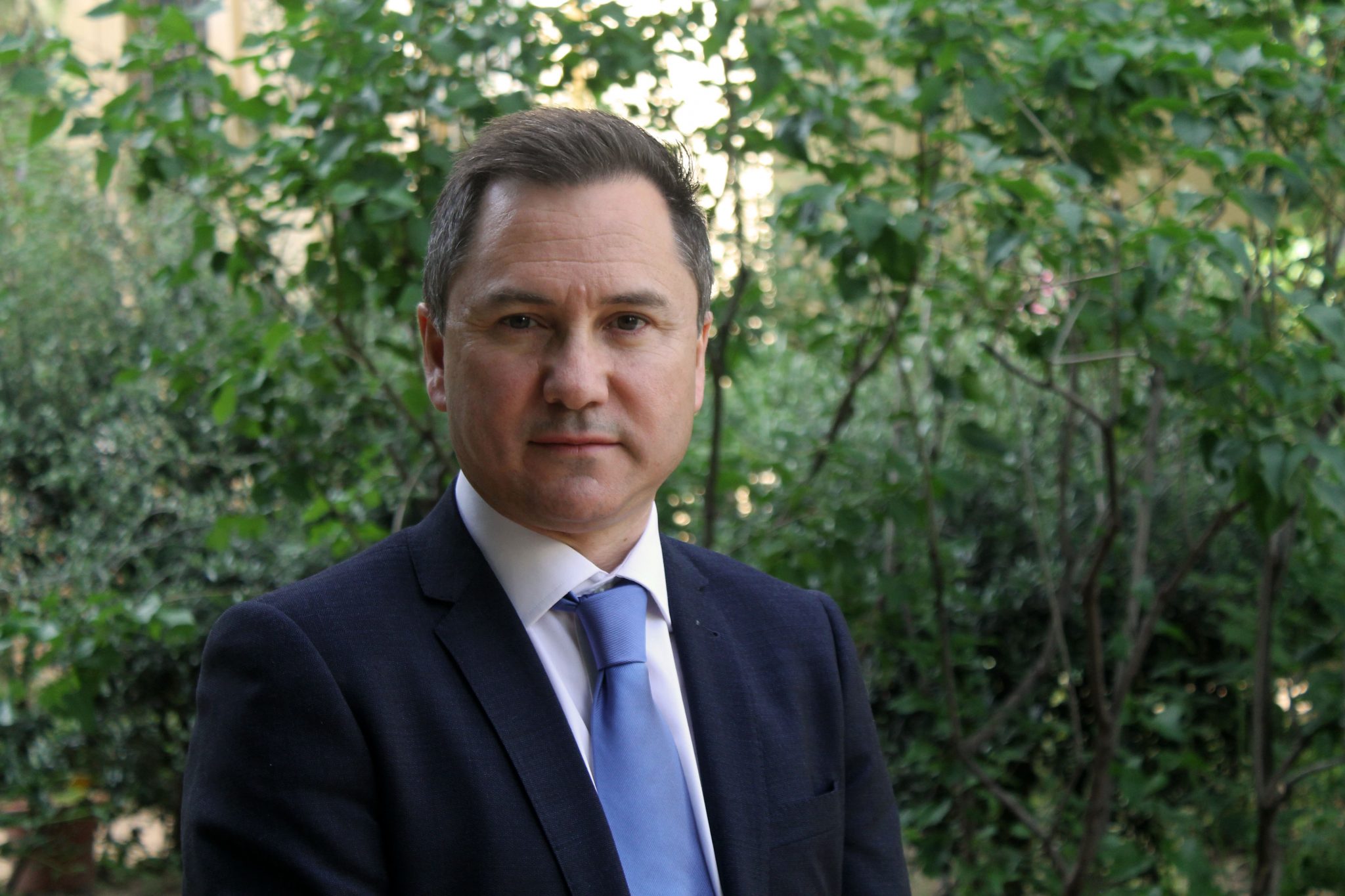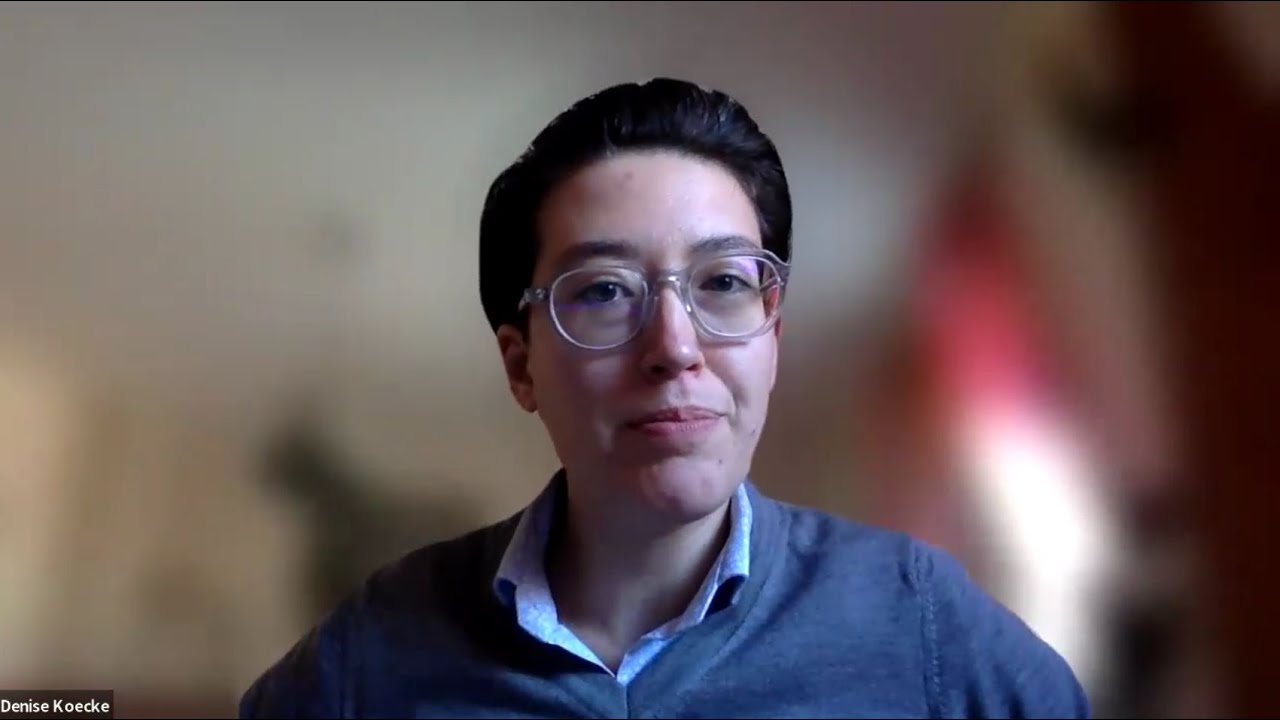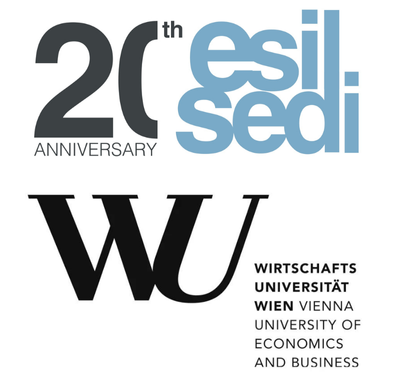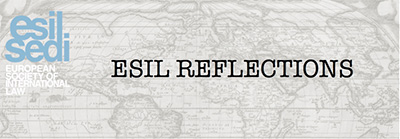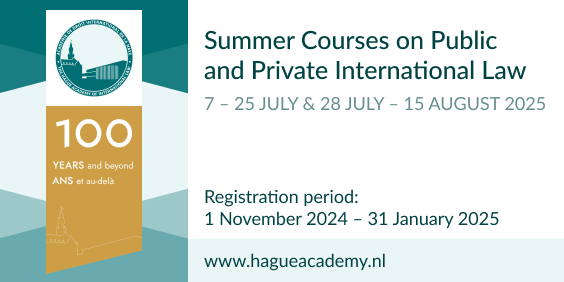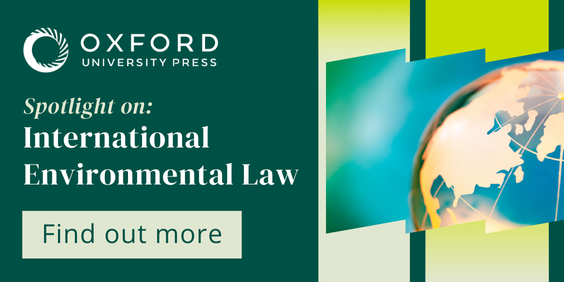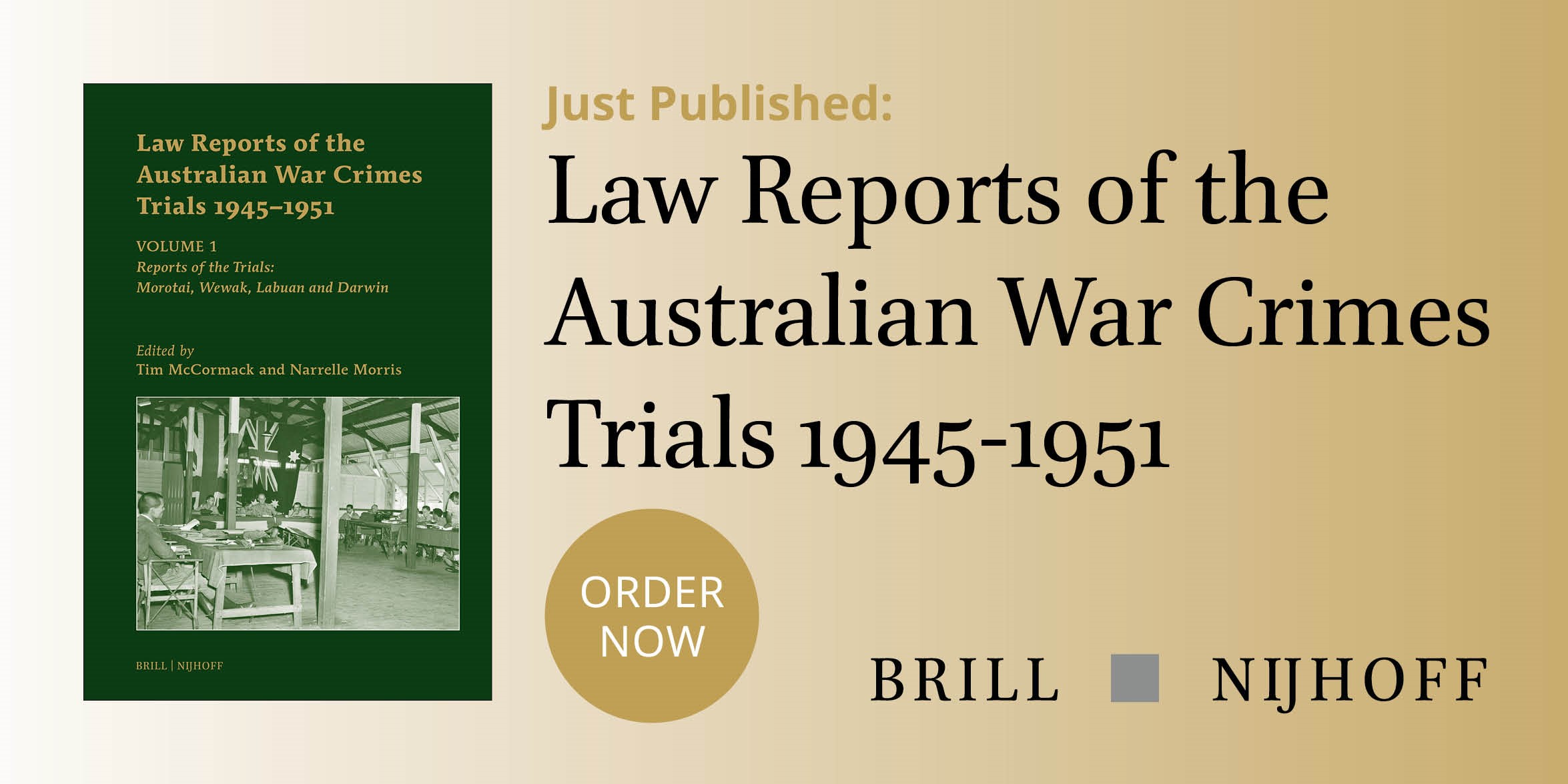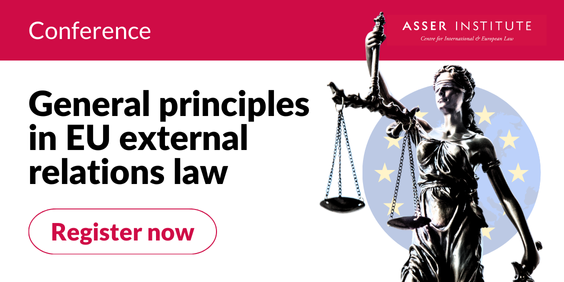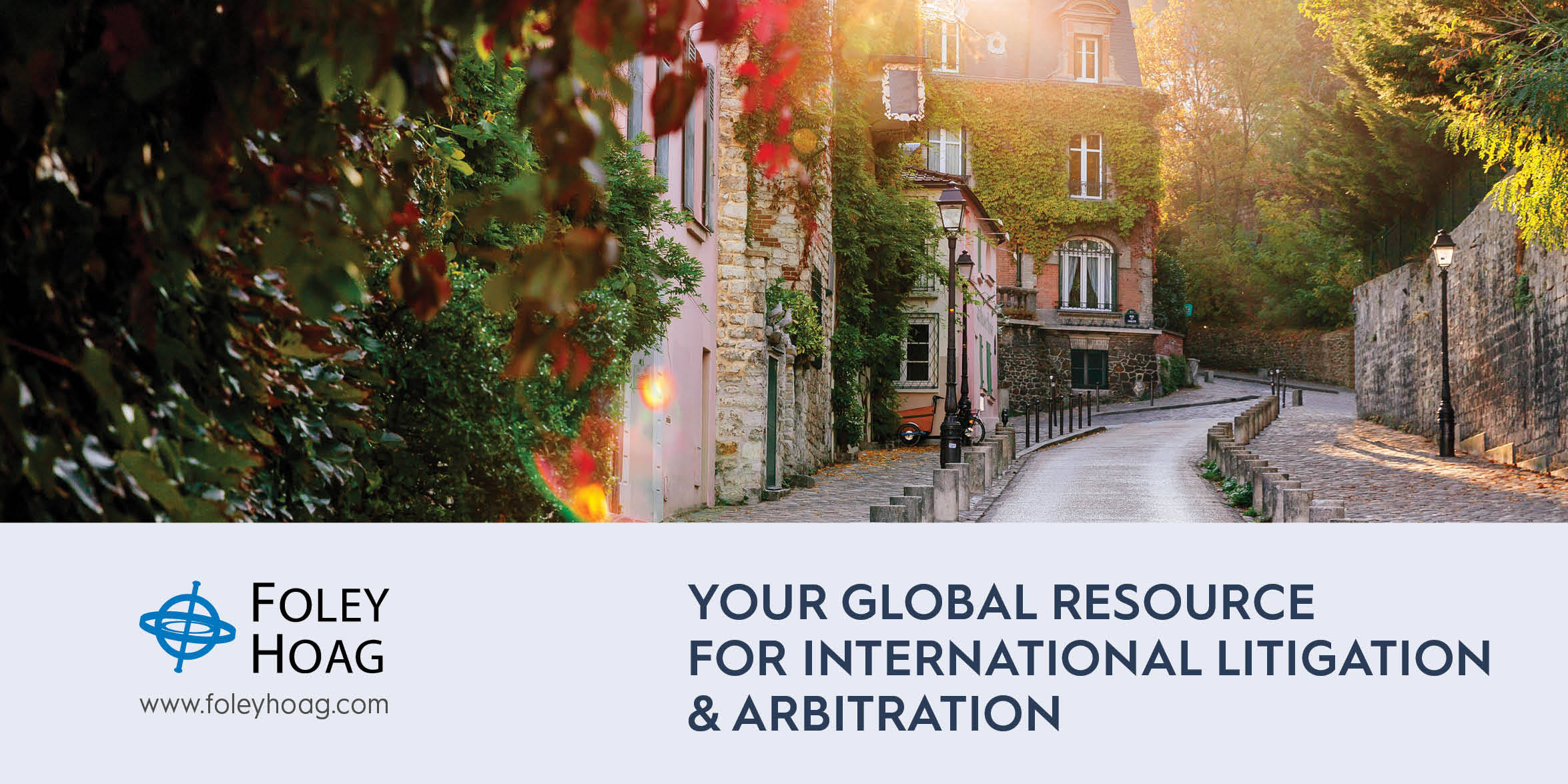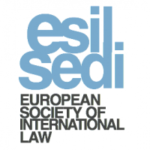ESIL Newsletter – Autumn 2024

Editors: Helmut Aust (Freie Universität Berlin) and Ana Salinas (Universidad de Málaga)
 In this issue
In this issue
1. Message of the President
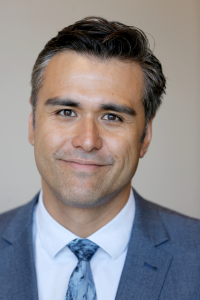
Dear ESIL members,
With our successful Vilnius conference now behind us, the academic year is in full swing and most of us are likely settling into a new teaching semester, welcoming new cohorts of students. Autumn is a period of transition and change: the nights become longer and colder, the colours of our foliage and communities changing rapidly. Fittingly, perhaps, that notion of change is the theme of my Newsletter entry, as change is very much in the air in our Society.
As announced in Vilnius, the Society marked its 20th anniversary with a strategic consultative review of our activities. To inspire and perhaps to provoke reflection, the Board created a Strategic Consultative Panel, composed of members representing different points in the Society’s evolution. After a year-long consultation, including two in-person gatherings at the EUI in Florence, the final SCP Report was welcomed by the outgoing Board in Vilnius, and the Panel has now wound up its work. With fresh elections behind us, the Board now embarks on a new phase: implementation. This will be an exciting year as we reflect on the Panel’s observations and recommendations, and see how we can weave some fresh ideas together and to inspire new initiatives as the Society embarks on its next decade.
During the General Assembly in Vilnius, I took the opportunity to describe the process and some of the themes touched upon in the Report. The Board has decided to publish the Report on the Society’s website in the autumn, as we reflect on its suggestions and begin to lay the foundations for new initiatives. We believe that even if we do not implement all of the proposals found in it, the publication of the Report will spark consultations and dialogue amongst all members of the Society. We hope that you will find a moment to read the Report once it is published.
At this stage, I prefer not to make any premature announcements. Within the Board, we have created new structures to start building concrete plans in respect of some of the Report’s key recommendations. Some will already be announced over the course of this academic year. And if we are fully to embrace all the recommendations of the Panel, the Society that will emerge at the end of this process would be significantly changed from our present ESIL. Change is not a bad thing, for all institutions need to evolve in line with the communities that they serve; but we hope also to preserve and to nurture what has made ESIL special for its members.
I am much obliged to Laurence Boisson de Chazournes, Jutta Brunnée, Lauri Malksöo, Matina Papadaki, and Anne Peters for joining the SCP process and for their vibrant and constructive contributions. I am particularly indebted to Neha Jain and Christian Tams, who were co-chairs of the SCP and guided us expertly. We were supported throughout the process by Anna Di Biase, Joyce Davies, Chloë Young and Antoine de Spiegeleir. On behalf of the Board, we thank you all for your hard work, hard work which will doubtlessly provide inspiration within our Society.
Yours faithfully,
Gleider Hernández
ESIL President
2. Guest Editorial by Antonio Segura Serrano: Cybersecurity, International Law and Academia
The worldwide challenge of cyberattacks is a regulatory issue of cardinal importance that international lawyers are addressing within the typical label of cybersecurity. The initial steps by which States had shown a cautious and calculated approach on cyberspace, leading to a “wait and see” strategy,[1] is progressively giving way to a more active response by States and international organisations alike.[2] In this vein, global cybersecurity is currently being achieved through a combination of dynamic or flexible interpretation of international law rules, on the one hand, and a normative development effort, on the other, both strengthened thanks to a good dose of enhanced international cooperation. Indeed, the work developed within the several United Nations Group of Governmental Experts (GGE) reports of 2010, 2013, 2015, and 2021,[3] together with the work of the Open-Ended Working Group (OEWG) in its 2021 report,[4] are pointing to a confirmation of the applicability of international law in cyberspace. They are leading as well towards a growing elucidation of the scope and limits that different international law rules framing current debates within the field have. This is the case for rules such as those setting the prohibition on the use of force and the attendant self-defence right, legal attribution, the sovereignty principle and the due diligence obligation, as considered by the already mentioned bodies. Moreover, the institutional task carried out within the United Nations and the Council of Europe is worth highlighting in terms of law-making activity, such as that achieved through the Budapest Convention on Cybercrime of 2001 and its recent Protocol of 2021, or in the case of the UN Convention against Cybercrime, adopted just two months ago. Even if the latter UN Convention has received overwhelmed criticism on the part of NGOs, allegedly based on its broad scope and its insufficient human rights safeguards, this UN Convention may be pointing towards a new era of a renewed international cooperation in the field.
Truly, normative development in the field of cybersecurity has been very scarce until now and reflection on issues related to this problem has mainly been the task of academia. The Tallinn Manual must be mentioned here, as the ultimate work to date in addressing the many legal intricacies that the application of international law to cyberspace prompts.[5] There are many more efforts in this direction, like the recent book edited by the undersigned author this year.[6] This special role of academics in the field of cybersecurity has been criticised as a form of interventionism.[7] However, unless it is purported that cyberspace is a no man’s land, it is difficult to answer in the positive whether IL applies and not dealing immediately with how IL applies to cyberspace. Since the inception of the liberal international order, international lawyers have participated (intervened?) in the international rule of law project (i.e. in managing substantive disagreement through legal form[8]) present at the UN Charter and, more generally, international law as a system. International security is a public good which must be preserved in cyberspace through legal principles already extant in the real world. Of course, different approaches lead to different results and reflecting on those diverse possible outcomes is surely the task that international lawyers should not avoid. The second OEWG has precisely asked academia to contribute to the discussion on the application of international law in its recent Annual Progress Report of July 2024.[9]
[1] D. Efrony and Y. Shany, “A Rule Book on the Shelf? Tallin Manual 2.0 on Cyberoperations and Subsequent State Practice” (2018) 112 American Journal of International Law, 633-634.
[2] A. Segura-Serrano, “Cybersecurity and Cybercrime: Dynamic Application versus Norm-Development” (2021) 81 Heidelberg Journal of International Law, 701.
[3] A/65/201, A/68/98, A/70/174 and A/76/135.
[4] A/75/816.
[5] Schmitt, M. N., (ed.), Tallinn Manual 2.0 on the International Law Applicable to Cyber Operations, Second Edition, Cambridge University Press, 2017.
[6] A. Segura-Serrano (ed.), Global Cybersecurity and International Law, Routledge, 2024.
[7] J. d’Aspremont, “Cyber Operations and International Law: An Interventionist Legal Thought” (2016) 21 Journal of Conflict and Security Law, 575–593.
[8] R. Collins, “How to defend international legal method?”, in Deplano, R. and Tsagourias, N., (eds.), Research Methods in International Law: A Handbook, Edward Elgar Publishing, 2021, 9 ff.
[9] A/AC.292/2024/CRP.1, para. 38.
3. Meet an ESIL member – Denise Koecke
You can find the video introducing Denise Koecke, Law Student at European University Viadrina in Frankfurt (Oder), Germany, and winner of the 2024 ESIL Early-Career Scholar Prize for the paper “Merging Man and Machine: A Legal Assessment of Brain-Computer Interfaces in Armed Conflict”, here.
4. What’s Going On?
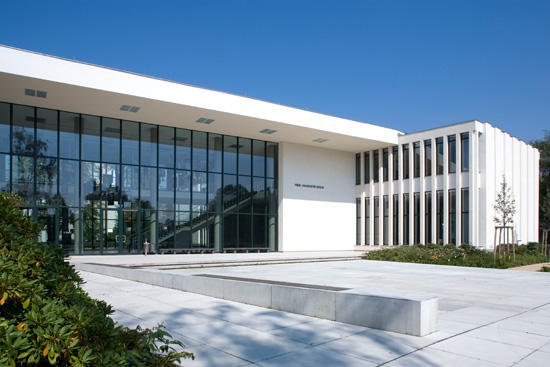 2025 ESIL Annual Conference in Berlin – CALL FOR PAPERS AVAILABLE!
2025 ESIL Annual Conference in Berlin – CALL FOR PAPERS AVAILABLE!
Freie Universität Berlin, 10-13 September 2025
For the last decade, international law has gone through a period of turbulence. In response, it is time to move beyond crisis narratives and adopt a forward-looking approach. For such an undertaking, the year 2025 offers an appropriate context. It will mark the 80th birthday of the United Nations, the institutional centre of the international legal order. At the same time, 2025 is just five years away from 2030 when the future direction of the current blueprint for global social order, the Sustainable Development Goals (SDGs), will need to be decided.
Come to Berlin for the 2025 annual conference of ESIL. Please visit the conference website www.esil2025.de for more information. In addition to plenary events and six curated fora, the Call for Papers for the 12 agorae has now been released – ten agorae with substantive themes and two slots reserved for submissions of ideas for a panel by ESIL interest groups. Submit your proposal until 31 January 2025 and be a part of our common endeavour to reconstruct international law.
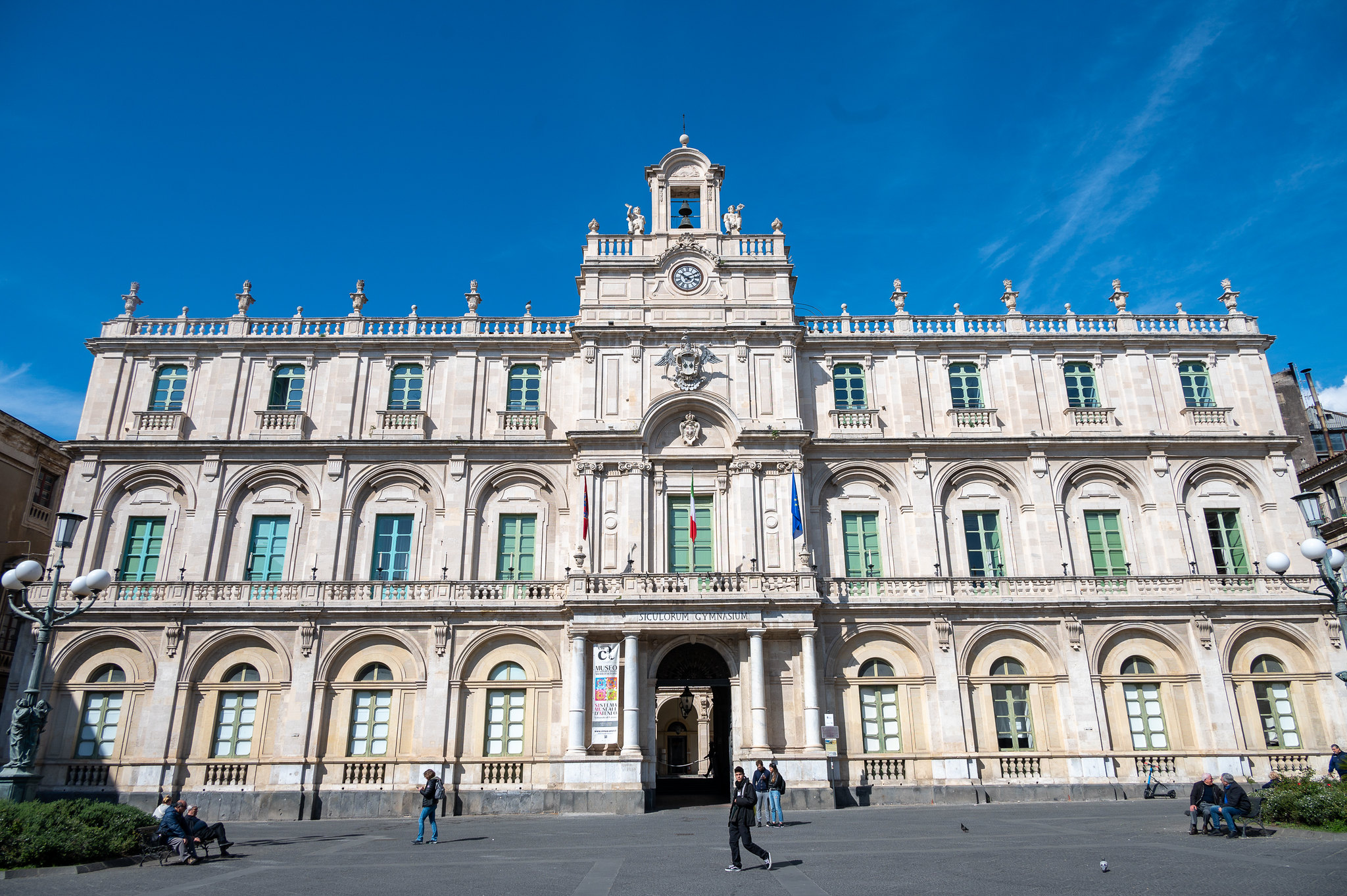 2025 ESIL Research Forum in Catania
2025 ESIL Research Forum in Catania
The 2024 ESIL Research Forum will take place on Thursday 20 and Friday 21 March 2025 and will be hosted by the Department of Law of the University of Catania. It addresses the topic: ‘International Law in the Age of Permacrisis’. The Call for Papers is now closed.
The selection process is currently ongoing and successful applicants will be notified by 30 November 2024.
The deadline for grant applications is 20 January 2025.
Have a look at the research forum website.
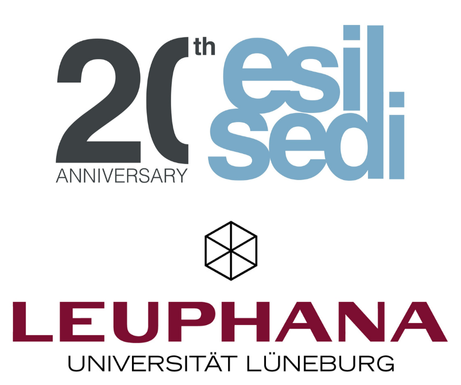 Joint ESIL-Leuphana Early-Career Workshop on “International Courts and Tribunals Interactions and Challenges”
Joint ESIL-Leuphana Early-Career Workshop on “International Courts and Tribunals Interactions and Challenges”
ESIL and Leuphana University are inviting ‘mini papers’ for a joint ESIL-Leuphana early-career workshop on ‘International Courts and Tribunals: Interactions and Challenges‘, to be held on 19-20 June 2025 in Lüneburg, Germany.
The workshop is aimed at early-career researchers (ECRs), with a focus on PhD candidates. It will offer ECRs a platform to present their work, to test arguments, and to benefit from constructive feedback in a supportive environment. To achieve these aims, the workshop will take the form of a small-group discussion focused on ECR work in a particular thematic area. Workshop sessions will be organised around the work of selected participants, which will be commented upon by more established academics and discussed with all workshop participants. All workshop participants are expected to participate actively in these discussions.
The workshop is organised by Leuphana University Lüneburg, with support by the European Society of International Law (ESIL) and input by members of ESIL’s early career network coordinating committee. Please find further details in the call for submissions. Submission Deadline: 30 January, 2025.
ESIL-supported event on “The autonomy of EU law under pressure? The changing landscape of the interactions between EU law and international law”
Vienna University of Economics and Business – WU is organizing an international ESIL-supported workshop titled “The autonomy of EU law under pressure? The changing landscape of the interactions between EU law and international law“, which will take place on 16-17 January 2025 in Vienna, at the premises of the WU.
Further details on the event are available on the conference webpage and in the call for papers.
The deadline for submissions of abstracts is s 31 October 2024 (Thursday), 24:00h (CET).
5. ESIL Early-Career Network Survey
The ESIL Early-Career Network Co-ordinating Committee wishes to expand the offer of ECR-tailored events during the ESIL annual events (Annual Conference and Research Forum). To this end, the Committee seeks to organise an additional ECR event during the 2025 ESIL Annual Conference in Berlin, to take place on the pre-conference day (before the ESIL Interest Groups workshops).
With the aim of organising an event that aligns with the interests of ECRs, the Committee invites feedback and suggestions on the content of the event.
The survey is open to both ESIL members and non-members, and you may submit your response until 30 November 2024.
This survey is created by the ESIL Early-Career Network Co-ordinating Committee. Should you have any suggestions or questions, the Committee can be contacted at esil.ecr@gmail.com“
Here’s the link to the survey: https://forms.gle/iqRn1k4Rns8QZEGf6
6. ESIL Paper Series / Conference Proceedings
The ESIL Paper Series features papers presented at ESIL events (Annual Conferences, Research Fora, and Interest Group events). Publication in the ESIL Paper Series enables authors to disseminate their work widely and reach broader audiences without the usual delays involved in more traditional means of publication. It does not prevent the subsequent publication of papers in academic journals or edited collections.
The current Series editors are ESIL Board members Federica Paddeu and Patryk Labuda.
ESIL Papers are included in the EUI CADMUS Research Repository. Five papers presented at the 2023 ESIL Research Forum in Tartu are now available, and also 5 papers presented at the 2024 ESIL Research Forum in Nicosia! All the papers presented at previous events from 2021 to 2023 are available here.
NOTE: Papers presented at ESIL Conferences from 2011 to 2019 can be downloaded here.
The ESIL Paper Series are being revamped to “ESIL Conference Proceedings” to create as complete a record as possible of the ESIL Conference (including interest group events), with a view to making it more inclusive and to providing a more comprehensive picture of the themes and ideas discussed at the Conference. To this end, after ESIL events, all speakers are invited to contribute notes of no more than 3,000 words (including footnotes) reflecting their remarks delivered at the Conference.
The deadline for submission of final papers for speakers at the 2024 ESIL Annual Conference is 30 October 2024.
7. ESIL Reflections
ESIL Reflections offer up-to-date reflections on current issues in international law. The Reflections cover a wide range of topics relating to current developments in international law and practice as well as theoretical reflections in a way that is relatively accessible to non-experts. The aim is to foster discussion between ESIL members and international law scholars and practitioners more generally – in Europe, but also beyond. ESIL Reflections are published on this website and distributed freely to ESIL members.
The editors are Patrycja Grzebyk (editor-in-chief), Lucas Lixinski, Alina Miron, Anne Saab and Peter-Tobias Stoll.
ESIL Members who have an interest in contributing are encouraged to do so. Please contact Patrycja Grzebyk (patrycja.grzebyk@uw.edu.pl) if you would like to contribute.
Latest publication:
- WIPO’s New Treaty on Intellectual Property, Genetic Resources and Traditional Knowledge – A Turning Point for Indigenous Heritage? by Ayla do Vale Alves
8. News from Interest Groups
 ESIL Interest Groups are a vital part of the Society’s success and activities. A list of the groups is available on the ESIL website.
ESIL Interest Groups are a vital part of the Society’s success and activities. A list of the groups is available on the ESIL website.
Interest Group on International Human Rights Law
The IG has recently launched its Scholarship in Progress (SiP) sessions, where IG Conveners would like to invite IG members to share their work-in-progress for the purpose of workshopping and collaboration in a monthly informal, online SiP Session.
Interest Group on Energy and International Law
The IG has recently had two events. On 13-14 June, it organized its very first conference titled ‘Trade-Related Climate Measures in Energy-Intensive Sectors: From Divergence to Interoperability through International Law?’. The Conference, which took place at the University of Geneva, aimed to shed light on the possible strategies to coordinate the implementation of trade-related climate measures in energy-intensive sectors at the international level. Selected papers presented at the conference will be published in the Journal of World Energy Law and Business as part of a Special Issue edited by the three Co-Conveners of the IG in February 2025. On 4 September, the IG organized a pre-conference titled ‘Floating Offshore Wind: The Law and Policy of an Emerging Technology’ on the occasion of the ESIL Annual Conference in Vilnius.

